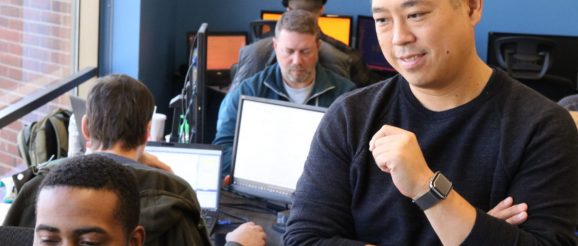How innovation in Baltimore led to Catalyte’s new $15M state contract

The Otterbein-based workforce training and data science company Catalyte recently got a chance to test its pipeline development strategies on a bigger stage by earning a nearly $15 million contract to develop tech talent for the State of Maryland.
It’s a program that stands on the shoulders of the 2020 technology and software development fellowship Catalyte did with the City of Baltimore. CEO Jacob Hsu has already talked to Barack Obama once, so it’s not a stretch to say that Catalyte could get a federal program contract in the years to come. Any success at the state level could presumably set an example for the rest of the country.
Maryland has already innovated its own workforce pipeline by eliminating the requirement of a four-year degree for state jobs. This policy change is key to the 90 and 100 new jobs Hsu said he wants to create.
“This is the actual manifestation of how we actually utilize that,” Hsu told Technical.ly. “Now that we’ve gotten rid of degree requirements, let’s create the talent base to produce and deliver. We all know there’re challenges in Baltimore but there are things that are happening here that are truly [for the] first time in the world. We should be shouting that from the mountaintop. We should be scaling these programs more.”
Both Catalyte and Largo, Maryland-based company Digital Network Group share the contract, which a statement said starts at $9 million over three years and has $3 million-per-year renewal options for two years afterward.
Hsu wants to get programs up and running, with Catalyte-trained software developers working across the state, as soon as Q3. For now, the contract allows those who sign up for software developer training in Maryland to access a wider pool of potential employers. With the contract, Catalyte can work directly with state agencies.
As the program scales over the next year, the company will eventually be able to match state employers to software devs with non-traditional tech backgrounds (i.e. those without four-year degrees or prior tech internships) by zip code. According to Hsu, the program will take software developers found through a screening test — one that involves looking at data points around behavior, skills and the ability to adapt quick thinking — and put them through a year’s worth of computer science training that the program condenses into five or six months. The CEO calls it harder than college, noting that people can’t come into it thinking it’s “kindergarten engineering.”
This process of screening and training, in Hsu’s experience, helps find software developers that go above and beyond baseline expectations. The local nature of the developer pool just adds to their fervor to fix problems and fill workforce gaps in local government. Driving the point home, Hsu often says that no one can fix issues with the water bill better than someone that uses it.
“This is talent from all walks of life,” Hsu said. “The thing about Catalyte is we’ve ultimately created a more fair and inclusive way to identify people that have these innate skills, talent and potential. We’ve shown that talent is everywhere. It’s hidden in plain sight.”
